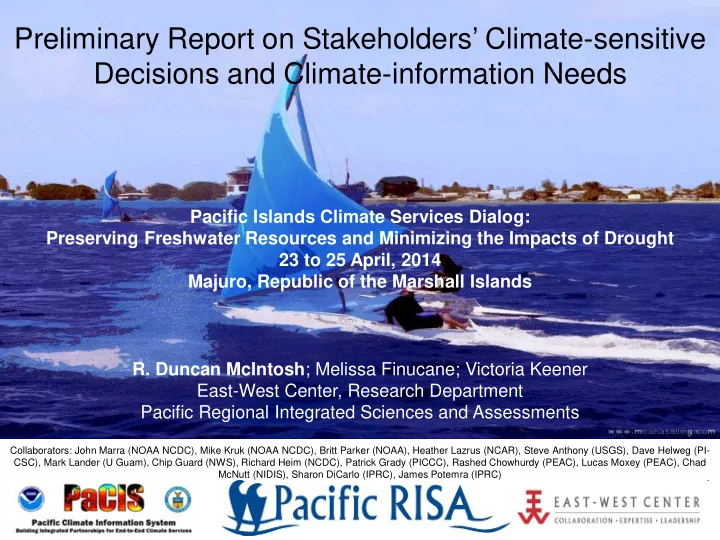

Preliminary Report on Stakeholders’ Climate-sensitive Decisions and Climate-information Needs Pacific Islands Climate Services Dialog: Preserving Freshwater Resources and Minimizing the Impacts of Drought 23 to 25 April, 2014 Majuro, Republic of the Marshall Islands R. Duncan McIntosh ; Melissa Finucane; Victoria Keener East-West Center, Research Department Pacific Regional Integrated Sciences and Assessments Collaborators: John Marra (NOAA NCDC), Mike Kruk (NOAA NCDC), Britt Parker (NOAA), Heather Lazrus (NCAR), Steve Anthony (USGS), Dave Helweg (PI- CSC), Mark Lander (U Guam), Chip Guard (NWS), Richard Heim (NCDC), Patrick Grady (PICCC), Rashed Chowhurdy (PEAC), Lucas Moxey (PEAC), Chad McNutt (NIDIS), Sharon DiCarlo (IPRC), James Potemra (IPRC)
Who we are: Regional Integrated Sciences & Assessments • An interdisciplinary research program that supports Pacific Island communities in adapting to climate variability and change.
What we do: Regional Integrated Sciences & Assessments • Pacific RISA uses a multi-method approach of interviews, workshops, and surveys to characterize what climate information decision makers need.
Objective of Study • Support the development of the dashboard by identifying key characteristics of: • Freshwater decision-makers in RMI • Their climate sensitive decisions • Their information needs • The broader contextual factors that influence drought management
Interview Protocol • Semi-structured interview to identify: • Key decisions affected by climate variables • Current use of climate information • Climate information needs for managing drought and fresh water resources
Ground Truthing the Interviews • Are these themes representative of what you would expect? • Are there groups, or sectors whose perspectives are missing?
Participants • Exploratory Study (additional stakeholder interviews are planned) • Convenience Sample representing decision makers from the following originations: College of the Marshall Islands International Federation of the Red Cross Micronesia Conservation Trust NOAA Weather Service Office Majuro Office of Environmental Planning and Policy USDA Forest Service Coordination (OEPPC), Office of the President, RMI
Common Themes: Preliminary Findings • Example Climate-Sensitive Decisions: • How to maintain high quality freshwater? • How to protect life and property via forecasts & warnings from wave inundation, wind events & hazards such as tsunamis, cyclones, and drought? • Are the 2013 drought conditions a passing thing or the new normal? • Where can we get more fresh water and manage resources better on atoll islands? • How to ensure Majuro reservoir system is full? • How to augment urban water supplies? • How to protect the coastline from sea level rise?
Preliminary Findings • Current Knowledge & Tools: IFRC household survey of water quality Indigenous knowledge about how to manage agroforestry crops Level of Majuro reservoir Long-term precipitation records RMI National Climate Change Policy Framework RMI State of Environment Snapshot (OEPPC)
Preliminary Findings • Current Sources of Climate Information: USAID assessment team Pacific ENSO Applications (for impacts of drought on Climate (PEAC) Center breadfruit mortality) NWS Offices: Majuro, Guam, Honolulu RMI Environmental Protection Agency Pacific Islands Regional Climate Assessment (PIRCA) Climate Change Focal Point
Preliminary Findings • Decision Timing: • Most attention to and political support for climate information will occur during a catastrophe like a drought (but not before); • Information provision could be linked with the timing of drought, which is typically worst during the Spring following an El Niño event, especially in the North of RMI; • Also helpful is linking information with the occurrence of king tides, which tend to be worst during a La Niña or the following year; • Most development projects are planned quarterly, while conservation management plans (available for some atolls only) are reviewed periodically, but not on a regular cycle; • Daily monitoring of Majuro reservoir: If <15M gallons; water rationing started.
Preliminary Findings • Decision-making Context: • drought dashboard best suited for specialists trained to interpret information? • or participatory science approach: NGOs and villages are assessing their own water resources?
Preliminary Findings • Information Needs: Climate variables • How do climate Climate Climate variables translate variables variables into meaningful impacts? Impacts ? • How does forecast rainfall translate into filling up catchments? • What is the impact of over-wash events on salinity of freshwater lens?
Preliminary Findings • Information Format Needs: • Spatially specific: Northern vs Southern Islands • Temporally specific: Comparison of climate projections with historical records (what were normal conditions during which traditional systems were developed)
Preliminary Findings • Training Needs: • Tie trainings to what individuals do in their daily work. • Trainings could teach participants how to assess climate vulnerability, adaptation, and resistance. • Trainings could teach participants how to integrate climate change information into conservation management plans. • Target trainings at multiple levels (communities, government agencies, mayors) at national and atoll scales • Hire permanent RMI hydrologist to study/monitor lens?
Preliminary Conclusions • Distinguish information by Northern vs Southern Islands. • Keep format simple and intuitive • Capture important trends simply (e.g. using arrows) • A collaborative approach is likely to be most successful, involving scientists, technical experts, government agencies, NGOs
Acknowledgements • Principal Investigators: Melissa Finucane, Ph.D. Victoria Keener, Ph.D. Senior Fellow, East-West Center Fellow, East-West Center finucanm@eastwestcenter.org keenerv@eastwestcenter.org • Thank you to the Pacific Islands Climate Science Center (PI-CSC) for travel support. • Support for this project was provided by NOAA Climate Programs Office for the Pacific RISA program (Grant # NA10OAR4310216). We are grateful to the people who participated in the interviews, donating their valuable time to provide diverse and informative perspectives. Thanks also to Krista Jaspers for help with transcribing the audio recordings. Thank you!
Recommend
More recommend